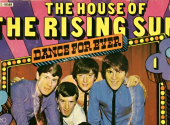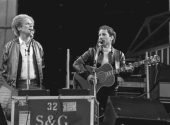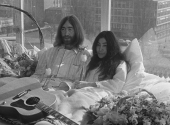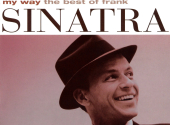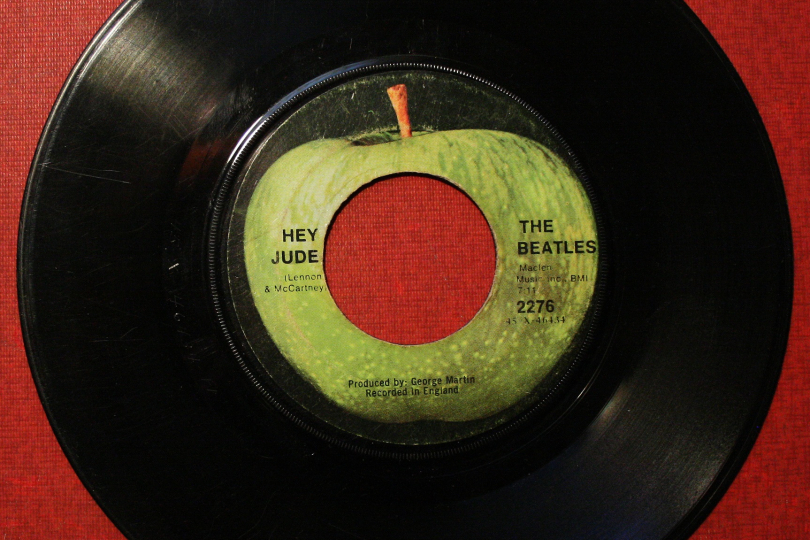
Story of a Hit #2: "Hey Jude"
The Beatles need no introduction, being arguably the most famous band in the history of music. They formed in 1960, split in 1970, and in those 10 years managed to change popular music forever. Today we're going to look at one of their biggest hits, still sung from stadiums to concert halls, all over the world.
Over the decade that the Beatles performed they wrote and released countless great songs that have been re-recorded dozens of times. So, why "Hey Jude"? Out of all the great songs that the Beatles penned, it's hardly the most remarkable or unique (nor is it my personal favourite). But I think you could argue that it is one of the most memorable as well as one of the most epic, largely owing to the enormous coda that takes up over half the song. It also has a terrific story, which gives us a glimpse into the band and the kind of relationships they had, which I think has helped cement it into music history.
It was released as a single in 1968 and was accompanied by this promotional video clip, filmed at Twickenham Film Studio. While made to look like a live performance, the clip was carefully mimed and staged, although the vocals were sung live. Towards the end of the clip, the audience joins the band on stage, milling around the Beatles and singing along to the coda in an apparent state of nirvana. According to Mark Hertsgaard (author of Beatles' biography A Day in the Life) it is a "quintessential sixties moment, a touching tableau of contentment and togetherness".
Paul McCartney wrote the song for John Lennon's son Julian, who he was quite close to, and the iconic first line of lyrics was originally "Hey Jules". The song was written to comfort Julian during the break-up of his father and mother, brought on by John's famous affair with Yoko Ono (which would eventually take John on his own musical career away from the Beatles). Supposedly Paul, on the drive up to visit Julian, wrote the song in the car, and he later changed the title to "Hey Jude" simply because he preferred the way it sounded. Something about the background of this song helps us picture what the band was like in their last years, like a glimpse into their private lives.
However, in an interview in 1980, John said he "always heard it as a song to me" and that he thought that perhaps "Hey Jude" was Paul's way of giving his blessing to John and Yoko's relationship. And still, others have reflected that the song was perhaps a message to Paul himself about his own turbulent relationships—some of the lyrics would certainly suggest that. It says something about the song, about the tenderness of the lyrics and their message, and I think it's one of the reasons that the song rings true with so many people. It speaks so directly to the listener—as if you too are Jude and this song might have actually been written for you.
The song was one of the first releases of the Beatles' new label Apple Music, along with three other singles that they produced, including "Those Were the Days". "Hey Jude" was a huge hit when it was brought out, topping the charts all over the world and at the time it was the longest ever single in the history of music—inspiring other artists to release similarly ambitious songs in the following years. In 2004 it was voted by Rolling Stone Magazine as the 8th greatest song of all time (however, in 2021 they revised that to 89th). Even Elvis Presley did a cover of it in 1969, which attests to its worldwide fame.
The lyrics themselves are wonderfully personal and at the same time appropriately vague. If you really read them, you can understand why so many people have interpreted them differently. Lines like "You have found her, now go and get her" hardly seem very appropriate for comforting 5-year-old Julian. And then other lines speak to almost everyone by appealing to some of our universal human flaws: "For well you know that it's a fool who plays it cool, by making his world a little colder." There are also some lovely backing vocals, sung by not only the other Beatles but most of the 36-piece orchestra who recorded the song. Also, if you listen closely to the original version you can actually hear Paul swear as he misses a chord.
The song is on the simpler side, musically, compared to other songs from their previous album Sgt Pepper's (think "Lucy in the Sky" and "Day in the Life"). One of the song's aspects that stands out is the apparent lack of a chorus: it instead follows a sort of AB format, or if you prefer, verse/bridge. Musicologists have had a field day analysing it, trying to explain why such a relatively simple song is so catchy and well-loved.
I personally love how at the end of the first verse, the drums kick in, and the bridge shifts up a fourth to a new key. And the way the song has that elegant turnaround at the end of the bridge, taking us back to the beginning and returning with the memorable "Hey Jude". At the end of the last verse, that iconic chant of "better, better, better" takes the band to this great climax, and Paul hits that ridiculous high F—which, by the way, he can still do to this day.
For the next 4 mins the song is basically just a jam-out on 4 chords and a chorus of "na, na, na, nanana na"—and it's this part that has made this song so iconic. There is something about its simplicity, the fact that anyone can join in because there are no words, so to speak, and everything is driven by that addictive chord progression. Their producer was concerned that no radio stations would want to play it, at over 7 minutes long, to which Lennon famously replied "they will if it's us"—and they certainly did.
I've often wondered if the chant-like quality of this coda wasn't perhaps inspired by the Beatles' time in India in 1967, because to me "Hey Jude" has always felt like a kind of group sing-along, akin to a spiritual mantra, albeit a boisterous one. Perhaps it is just a little bit too long, but the extravagance of it all is what makes it stand out. And when you see a stadium full of fans singing at the top of their voices, like at the London Olympics in 2012, then you can't deny that it has a sort of dizzying power.
What do you think: is "Hey Jude" the greatest Beatles song? What would you vote for?
Leave us your opinion in the comments below!
If you have found an error or typo in the article, please let us know by e-mail info@insounder.org.


